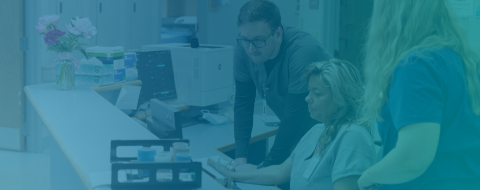Virtual Summit Learning Objectives
- Learn best practices from DRCHSD peers on:
- How to address inequities to care
- Developing a best practice patient navigator model
- Developing a best practice continuity of care model
- Understand how to develop telehealth service lines to position for the future
- Learn how to assess value-based care options and next steps
- Understand most current policy and regulatory issues
- Learn tips on how to build resiliency in your employees
- Understand how to meet your community's behavioral health needs
Summit Sessions
Reducing Barriers to Address Inequities in Health Care
- This session will provide education on health care disparities by focusing on not only statistics but awareness and inclusion. It will provide an understanding on the causes of health care disparities and share tools, and peer examples to help achieve health care equity.
Reducing Barriers to Address Inequities in Healthcare
(1.92 MB)
ED Navigation Using a Patient Navigator: A Best Practice Model
- The root of the problem for high Medicaid ED utilizers typically stems from lack of primary care access, substance abuse issues, chronic medical conditions, and lack of mental health care access. This best practice model identifies the need of primary care access for their Medicaid population stemmed through a CHNA and by retrieving Medicaid claims data from their state Medicaid agency. Through Community Care Coordination (CCC) and by utilizing a patient navigator, this hospital identified where to message and market their primary care clinic services.
NRMC 2020 Delta Summit Hospital Sharing
(1.38 MB)
Making Connections for Healthy Rural Communities: Ste. Genevieve's Continuity of Care Best Practice Model
- Ste. Genevieve County Memorial Hospital (SGCMH) is one of only four critical access hospitals that received national recognition for demonstrating innovative care coordination initiatives to improve population health. SGCMH provides high value care to patients and those from larger acute care hospitals to help transition patient care and reduce readmissions by offering a service that allows care to be flexed to meet the needs of each individual patient. This session will discuss how SGCMH identified the needs in their community that led to further development of their transitional care/swing bed program.
Transitional Care: Partnering for Population Health - Hirshell Parker
(1.85 MB)
Virtual Care Workshop 101 & 201 - Developing Telehealth Service Lines to Position for the Future
- 101 Session: Introductory to developing your virtual care service lines to position for the future including how to assess your community's telehealth needs; understanding the basics of telehealth workflow; identifying how to expand your market share utilizing telehealth; and, discovering implementation strategies from your peers' telehealth journeys.
- 201 Session: Taking the next steps in developing your virtual care service lines to position for the future by learning best practices to outreach and educate patients on how to utilize telehealth and learn next steps on how to support your unique population with telehealth platforms.
Virtual Care Workshop.pdf
(665.68 KB)
Value-Based Care Workshop 101 & 201 - Assessing and Building Value-Based Care Capacity in Rural Health Care Organizations
- 101 Session: Will provide an overview of value-based care (VBC) including when and where VBC began, what is needed to be successful in the VBC environment, the importance of a governance and oversight infrastructure and options that are available.
- 201 Session: Review the most common risk management initiatives, outline physician engagement strategies and communication, understand where to start with your data analytics, discuss the financial implications of moving into VBC and identify your next steps in the VBC journey.
Value-Based Care Workshop 101 & 201
(1.54 MB)
DRCHSD Communication Toolkit and Educational Series
- As part of the Delta Region Community Health Systems Development Program, we recognize the need for customizable communication support and education for participating hospitals and clinics. Join this brief session to provide your feedback on topics and learn about the launch of a new communication toolkit and educational series.
Legato - DRCHSD Communication Toolkit and Educational Series
(310.8 KB)
Policy and Regulatory Updates
- This session will provide important information on federal rural health policy and regulatory updates.
Employee Burnout and Resiliency: What can we do right now?
- Learn how helping employees build resiliency is not only the right thing to do for the health and well-being of your staff but it can also have a positive impact on retention and strengthen organizational culture.
Employee Burnout and Resiliency: What can we do right now? - Jennifer Higgins 3RNet
(858.03 KB)
Meeting Your Communities Behavioral Health Needs
- Recent events have served to highlight a continued lack of awareness and understanding of the significance of social and environmental factors as it relates to improving the quality of mental health care.
Meeting Your Communities’ Behavioral Health Needs
(4.99 MB)
Virtual Logistics
The conference will be accommodated by Performedia, a third-party organization specialized in hosting virtual events. All sessions will be recorded and can be found on the portal link below.
For more information, please contact:
Kaisha Grahamkgraham@ruralcenter.org(218) 216-7020




